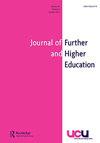理解高等教育学生的归属感:一个定性的元民族志分析
IF 2.4
Q1 EDUCATION & EDUCATIONAL RESEARCH
引用次数: 2
摘要
摘要当前关于“归属感”的文献涉及多个学科,在这些学科之间的定义上没有明显的共识,归属感是时间性的和情境敏感的(例如在新冠肺炎期间)。特别是,需要从最新的角度仔细研究学生如何定义归属感,以帮助他们在“新常态”和“下一常态”后疫情时代感受到与教师/校园的联系,并改善他们的幸福感和心理健康。因此,本研究从高等教育学生的角度探讨了他们的归属感,这一概念尚未得到充分的概念化。由于这些观点是主观的,因此需要一种解释方法来产生丰富的意义。本研究采用了元人种学的方法来综合定性研究,这允许通过翻译将研究进行比较和综合,形成新的解释。解释性定性综合产生了一个高阶概念、四个主要概念和十九个子概念,这些概念概念化了高等教育学生对大学归属感的理解。本文章由计算机程序翻译,如有差异,请以英文原文为准。
Understanding higher education students’ sense of belonging: a qualitative meta-ethnographic analysis
ABSTRACT The current literature on ‘sense of belonging’ spans a number of disciplines, with no apparent consensus on definition between these, complicated by the fact that sense of belonging is temporal and context-sensitive (such as during COVID-19). In particular, a closer look at how students define sense of belonging is needed from an up-to-date perspective to help them feel more connected to the faculty/campus and improve their wellbeing and mental health in the ‘new normal’ and ‘next normal’ post-pandemic eras. Therefore, this study explores higher education students’ sense of belonging, a concept that has not been adequately conceptualised, from their perspectives. As these perspectives are subjective, an interpretive approach is required to generate rich meanings. This study has adopted a meta-ethnographic approach to synthesise qualitative studies, which allows for comparison and synthesis of studies into a new interpretation through translations. Interpretive qualitative synthesis resulted in one higher-order concept, four main concepts, and nineteen sub-concepts that conceptualise higher education students’ understanding of sense of belonging to their universities.
求助全文
通过发布文献求助,成功后即可免费获取论文全文。
去求助
来源期刊

JOURNAL OF FURTHER AND HIGHER EDUCATION
EDUCATION & EDUCATIONAL RESEARCH-
CiteScore
5.20
自引率
4.30%
发文量
80
期刊介绍:
Journal of Further and Higher Education is an international, peer-reviewed journal publishing scholarly work that represents the whole field of post-16 education and training. The journal engages with a diverse range of topics within the field including management and administration, teacher education and training, curriculum, staff and institutional development, and teaching and learning strategies and processes. Through encouraging engagement with and around policy, contemporary pedagogic issues and professional concerns within different educational systems around the globe, Journal of Further and Higher Education is committed to promoting excellence by providing a forum for scholarly debate and evaluation. Articles that are accepted for publication probe and offer original insights in an accessible, succinct style, and debate and critique practice, research, theory. They offer informed perspectives on contextual and professional matters and critically examine the relationship between theory and practice across the spectrum of further and higher education.
 求助内容:
求助内容: 应助结果提醒方式:
应助结果提醒方式:


